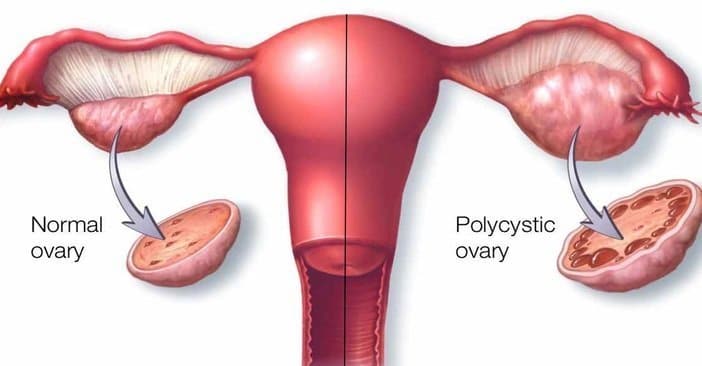
Introduction
A condition in which women have a number of small cysts around the edge of their ovaries. Women with PCOD either ovulate infrequently or fail to ovulate which leads to infertility problems. About one in every five women has polycystic ovaries. It can’t be cured but can be treated or managed otherwise it may lead to various problems in later life.
Polycystic ovaries:
Actually ovaries are responsible for making the main female hormone (oestrogen) and some quantity of male hormones (androgens) such as testosterone. But in some cases ovaries carries large number of harmless cysts that are not bigger in size are known as polycystic ovaries. A cyst is a fluid filled cavity in the body which have not developed properly due to hormone imbalance. In this condition none of the follicles develops to that extent where it releases an egg .i.e. ovulation does not take place.
Some women have higher level of male hormone than normal which results in many complicated symptoms. But some may have polycystic ovaries without having any symptoms.
Who are affected?
Women who are overweight or obese are likely to have PCOS and due to the family history of having diabetes and high cholesterol level.
Symptoms of polycystic ovary syndrome
- Irregular periods
- High level of male hormones
- Cysts in the ovaries
- Heavy bleeding
- Acne
- Headache
- Darkening of the skin
- Male pattern baldness
- No periods
- Weight gain
- Hair loss
- Depression
- Excessive hair growth
- Infertility
Causes:
- Resistance to insulin
There is a hormone called insulin produced by pancreas which controls the amount of sugar in the blood. Here the level of insulin goes so high due to which ovaries produce too much testosterone which interrupts the development of the follicles and affects natural ovulation process.
- Overweight
Due to the condition of having excessive weight makes the symptoms of PCOS more pronounced because of extra fat in the body which produces more insulin.
- Hormone imbalance
Imbalance of certain hormones is found in many women like:
- Raised level of luteinising hormone (LH).
- Raised level of testosterone and other male sex hormones.
- A thyroid gland that does not function normally.
- Reduced levels of follicle stimulating hormone (FSH) and progesterone.
- Raised levels of prolactin.
Diagnosis:
- Ultrasound scan
- Blood tests
Treatment
- Lifestyle changes
By doing 45-60 min of aerobics, following healthy diet plan can improve the fertility rate in women having PCOS.
- Hormone treatment
This treatment may include various drugs like:
- Cyproterone acetate
- Spironolactone
- Flutamide
- Finasteride
- Diabetes drug
It reduces the risk of insulin resistance and help to increase ovulation in women suffering from PCOS.
- Vaniqa cream
It is a cream which helps in reducing the growth of unwanted facial hair by inhibits the action of the enzyme which is found in the hair follicles needed for hair growth.
- Clomiphene
When someone is trying to conceive but not ovulating this fertility drug is given to improve your fertility by correcting hormone imbalance.
- Surgery
Minor surgical option is available which is known as laparoscopic ovarian drilling (LOD).
- Other medications
- Metformin
- Gonadotropins
- Clomiphene
- Letrozole
If you are having PCOS then you might be at higher risk of complications in pregnancy like high blood pressure, gestational diabetes and even miscarriage. Losing weight and treating LH level and insulin resistance will reduce the chances of miscarriage in pregnancy. Consult a doctor for the proper treatment and management of PCOS/PCOD.
Note: Medical information provided in the article is intended only for information purpose and should not be considered as medical advice.
